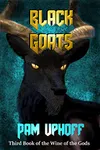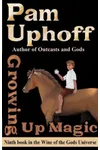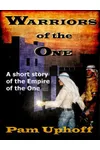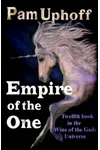Step into the thrilling multiverse of the Wine of the Gods, where genetically engineered superhumans defy oppression and rewrite the rules of reality! Pam Uphoff’s sprawling science fiction series blends high-stakes adventure with mind-bending themes of identity, freedom, and the ethics of genetic modification. From parallel planets to psychic powers, this saga captivates with its bold vision of humanity’s potential.
With a unique mix of sci-fi, fantasy, and social commentary, Wine of the Gods follows a group of enhanced teens and young adults navigating a world that brands them as property. Their rebellion and exile to a challenging parallel Earth spark a 1500-year epic that’s as thought-provoking as it is exhilarating.
How Wine of the Gods Began
Pam Uphoff, a California native and self-professed horse enthusiast, crafted the Wine of the Gods series from her lifelong love of science fiction. After years of writing for herself, she took the leap to self-publish, bypassing traditional publishing delays to share her vivid multiverse with readers. Inspired by classic sci-fi themes of genetic engineering and societal prejudice, Uphoff began the series in 2011 with Outcasts and Gods, laying the foundation for a saga that now spans dozens of novels and novellas.
Uphoff’s unconventional approach—blending fast-paced plots with quirky humor, like turning enemies into purple bunnies—set the series apart. Her knack for world-building and character-driven storytelling turned Wine of the Gods into a cult favorite among sci-fi fans seeking fresh, imaginative narratives.
The Heart of Wine of the Gods
The series kicks off with Outcasts and Gods, where Wolfgang Oldham, a genetically engineered teen, grapples with his identity after being seized from his family. Branded non-human, he and others are trained by a corporation, only to uncover their dangerous potential. The story races through subterfuge and exploration, setting a relentless pace. Exiles and Gods, the second book, comprises three novellas that follow the exiles’ lives on a parallel Earth, tackling survival, social change, and their evolving powers over centuries.
Explorers, the fourth installment, shifts gears as Earth reopens a gate to the exiles’ planet, sparking clashes reminiscent of colonial struggles. Spy Wars, book five, dives into espionage as the exiles outwit two rival powers vying for their world. Themes of identity and freedom weave through every book, questioning what it means to be human when society deems you property. Uphoff’s style—packed with intrigue, humor, and psychic ‘magic’—creates a vivid multiverse where parallel worlds and nanotech feel as real as they are fantastical.
The series’ setting, spanning Earth and parallel planets, evolves over 1500 years, blending near-future tech with fantasy-like abilities. While some criticize its occasional dark themes, like oppression or violence, fans praise its inventive plots and lovable characters, making it a standout in sci-fi.
Why Wine of the Gods Resonates
Wine of the Gods has carved a niche in science fiction for its bold take on genetic engineering and its critique of societal prejudice. Its exploration of autonomy and resilience resonates with readers who love stories of underdogs defying the odds. The series’ cult following eagerly awaits each release, drawn to its mix of epic scope and quirky charm, like gods morphing foes into bunnies.
Though not a mainstream blockbuster, its influence lies in its fearless creativity and Uphoff’s commitment to sharing her vision through self-publishing. For fans, it’s a hidden gem that challenges conventions and sparks debate about humanity’s future, ensuring its lasting appeal in the sci-fi community.
- First published: 2011
- Number of books: 47+ (including novels, novellas, and short stories)
- Key themes: Genetic engineering, identity, freedom, ethics
- Setting: Earth and parallel planets
Ready to explore a universe where superhumans rewrite destiny? Grab Outcasts and Gods and dive into the Wine of the Gods saga today!




















